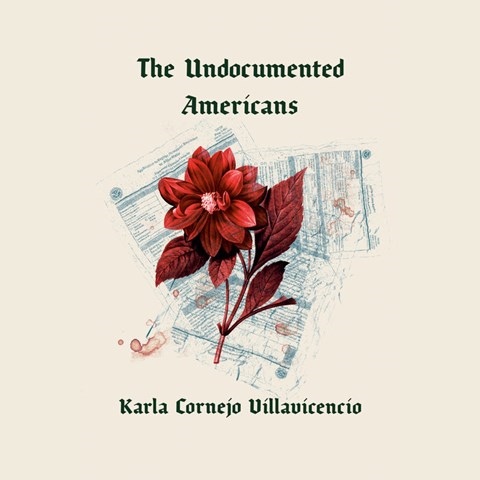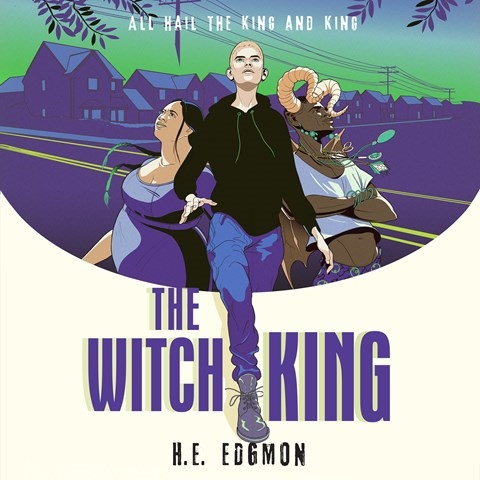There are so many wonderful books featuring immigrant stories that picking only three for this month’s column felt nearly impossible. These three are all fantastic audiobooks, and they all tell very different stories about being an immigrant in the U.S. But they’re also about as far apart from each other, genre-wise, as it is possible for three books to be. And that’s something to celebrate. Immigrant stories do not come in just one shape or size. These books—a family saga with historical and contemporary storylines, a work of nonfiction that blends memoir and journalism, and a YA fantasy—are only a few of many.
THINGS WE LOST TO THE WATER by Eric Nguyen and read by Quyen Ngo begins in 1979, when Huong flees Vietnam with her two young songs, Tuan and Binh. Her husband Công is left behind. Over the next thirty years, as Huong, Tuan, and Binh struggle through the messy realities of life as immigrants in New Orleans, Công’s absence haunts them all in different ways. In some ways, it’s a classic immigrant story—but only because it is about a family who leaves their home country in search of something else in the United States. The gorgeous specificity of the characters, the intimate details of their lives, and the unique ways they react to the world around them are reminders that there is no such thing as a “typical” immigrant story.
Nguyen’s lyrical prose is beautifully poetic at times, and Quyen Ngo gives it the thoughtfulness it deserves, with slow, quiet narration that feels almost like a spell. She brings each character fully to life, and she’s especially good at honoring their different internal thought processes. The story shifts between points of view, and each time the narrative switches to a new character, it feels like coming home—Ngo’s voicing is so consistent. There is quite a lot of Vietnamese spoken throughout the book, sometimes just a word or phrase, and sometimes short conversations. It’s an added joy to get to hear the characters, especially Huong, speaking their native language.
 Another audiobook that explores that vast diversity of immigrant experiences is Karla Cornejo Villavicencio’s THE UNDOCUMENTED AMERICANS, which she narrates herself. In this extraordinary book, a blend of memoir and reporting, Villavicencio writes about her experiences as an undocumented immigrant. She also travels the country speaking to other undocumented people about their daily lives, and about how major events, such as 9/11 and the 2016 election, have impacted them. One of the book’s strengths is that Villavicencio refuses to separate herself from the people whose stories she shares. Her writing is empathetic and raw; it’s clear-sighted, human-centered journalism. She brings this same compassion and honesty to her narration. Her voice is not even, objective, and measured. It’s full of life: angry, exhausted, hurt, proud, determined. At just under five hours, this is not a long listen, but it’s a powerful one. Villavicencio wants you to sit up and pay attention—you can hear it in her voice—and after reading this book, listeners will find it hard not to do just that.
Another audiobook that explores that vast diversity of immigrant experiences is Karla Cornejo Villavicencio’s THE UNDOCUMENTED AMERICANS, which she narrates herself. In this extraordinary book, a blend of memoir and reporting, Villavicencio writes about her experiences as an undocumented immigrant. She also travels the country speaking to other undocumented people about their daily lives, and about how major events, such as 9/11 and the 2016 election, have impacted them. One of the book’s strengths is that Villavicencio refuses to separate herself from the people whose stories she shares. Her writing is empathetic and raw; it’s clear-sighted, human-centered journalism. She brings this same compassion and honesty to her narration. Her voice is not even, objective, and measured. It’s full of life: angry, exhausted, hurt, proud, determined. At just under five hours, this is not a long listen, but it’s a powerful one. Villavicencio wants you to sit up and pay attention—you can hear it in her voice—and after reading this book, listeners will find it hard not to do just that.
 Sometimes science fiction and fantasy novels illuminate truths about the world we live in, often in ways that realistic fiction books can’t. THE WITCH KING by H.E. Edgmon, read with gusto by Dani Martineck, is a YA fantasy about a trans witch named Wyatt. Martineck’s combination of humor and earnestness sets the perfect tone for this sometimes-serious and sometimes-hilarious novel. It’s not about immigration, but it is full of immigrants. After losing control of his magic, Wyatt flees the fae kingdom of Asalin for the human world. He makes a new life for himself with a human family, and he doesn't miss the way witches were treated by the fae in Asalin. So when his betrothed, the fae prince Emyr, comes looking for him and begs him to come back to Asalin and its thorny politics, Wyatt goes reluctantly. Back in Asalin, he finds he doesn’t see anything the same way anymore.
Sometimes science fiction and fantasy novels illuminate truths about the world we live in, often in ways that realistic fiction books can’t. THE WITCH KING by H.E. Edgmon, read with gusto by Dani Martineck, is a YA fantasy about a trans witch named Wyatt. Martineck’s combination of humor and earnestness sets the perfect tone for this sometimes-serious and sometimes-hilarious novel. It’s not about immigration, but it is full of immigrants. After losing control of his magic, Wyatt flees the fae kingdom of Asalin for the human world. He makes a new life for himself with a human family, and he doesn't miss the way witches were treated by the fae in Asalin. So when his betrothed, the fae prince Emyr, comes looking for him and begs him to come back to Asalin and its thorny politics, Wyatt goes reluctantly. Back in Asalin, he finds he doesn’t see anything the same way anymore.
Dani Martineck’s narration is as lively and fast-paced as the novel itself. They effortlessly transform their voice into that of an angry, fiery, lonely, and determined teenage boy. Wyatt is direct about what he wants and what he thinks, and all his brashness comes across beautifully in Martineck’s narration. Martineck is also adept at other character voices: Emyr’s smooth tones, the bouncy cadences of Wyatt’s human sister, and the haughty voices of fae royalty. This is a novel about what it means to belong somewhere and leave it, how immigration can change someone’s perspective, and the harm that walls of all kinds can cause. But none of these hefty themes overshadow the rollicking adventure and tender love story.








